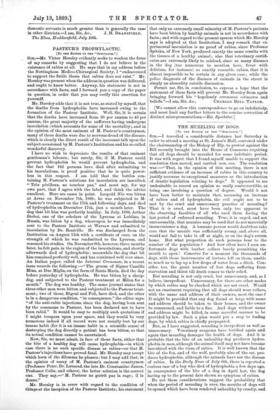PASTEUR'S PROPHYLACTIC.
[To THE EDITOR OF TRH "SPECTATOR."]
SIB,—Mr. Victor Horsley evidently seeks to weaken the force of my remarks by suggesting that I do not believe in the existence of rabies at all. He says that in my address before the Nottingham Medico-Chirurgical Society, I "endeavoured to support the futile thesis that rabies does not exist." Mr. Horsley was present when the address in question was delivered, and ought to know better. Anyway, his statement is not in accordance with facts, and I forward you a copy of the paper in question, in order that you may verify this assertion for yourself.
Mr. Horsley adds that it is not true, as stated by myself, that the deaths from hydrophobia have increased owing to the formation of the Pasteur Institute. Well, Sir, it is certain that the deaths have increased from 30 per annum to 43 per annum, the great majority of the sufferers having undergone inoculation (which accounts for some of the mortality), and in the opinion of the most eminent of M. Pasteur's countrymen, many of these deaths were due to nervous dread of the disease, which is clearly the direct result of the incessant talk upon the subject occasioned by M. Pasteur's Institution and his so-called wonderful discovery.
I have no wish to depreciate the results of that eminent gentleman's labours; but surely, Sir, if M. Pasteur could prevent hydrophobia he would prevent hydrophobia, and the fact that 162 persons have died after submitting to his inoculations, is proof positive that he is quite power- less in this respect. I am told that the bottles con- taining M. Pasteur's solutions for inoculation are inscribed,
Tres perilleux, ne touohez pas," and must say, for my own part, that I agree with the label, and think the advice excellent. Here are cases in point. Leopold Nee was bitten at Arras on November 7th, 1886; he was subjected to M. Pasteur's treatment on the 17th and following days, and died of hydrophobia on December 17th, just a month later. The dog that bit him was perfectly healthy. In July, 1886, Arthur Stoboi, one of the scholars of the Lyceum at Lubline, in Russia, was bitten by a dog, whereupon he was immediately sent to the Pasteur Institute at Warsaw and submitted to inoculation by Dr. Boniville. He was discharged from the Institution on August 11th with a certificate of cure, on the strength of which he was readmitted to the Lyceum, and resumed his studies. On November 9th, however, three months later, he felt pain in the region of the inoculations, and shortly afterwards died of hydrophobia: meanwhile the dog that bit him remained perfectly well, and has continued well ever since. An Italian paper, called the Interessi Cremonese, in a recent issue records the following :—" The groom of Signor Camillo Mina, at Due Miglia, on the farm of Santa Maria, died the day before yesterday of hydrophobia. He was bitten by a sheep- dog, and subjected to the Pasteur treatment at Milan for a month." The dog was healthy. The same journal states that three other men were bitten and subjected to the Pasteur treat- ment ; two of these, Rigoni and Poll, have died, and the other is in a dangerous condition, "in consequence," the editor says, "of the anti-rabic injections, since the dog, having been sent by the commune to Pasteur, has been declared not to have been rabid." It would be easy to multiply such quotations if I might trespass upon your space, and they would be very numerous indeed if all record were not usually lost by our insane habit (for it is an insane habit in a scientific sense) of destroying the dog directly a patient has been bitten, so that its actual condition cannot be ascertained.
Now, Sir, we must admit, in face of these facts, either that the bite of a healthy dog will cause hydrophobia—in which case there is no such specific disease as rabies—or that M.
Pasteur's injections have proved fatal. Mr. Horsley may accept which horn of the dilemma he pleases ; but I may add that, in the opinion of many of M. Pasteur's eminent countrymen (Professor Peter, Dr. Luteaud, the late Dr. Constantine James, Professor Colin, and others), the latter solution is the correct one. They say,—" M. Pasteur ne guerit pas la rage ; il la donne."
Mr. Horsley is in error with regard to the condition of things at the inception of the Pasteur Institute; his statement that only an extremely small minority of M. Pasteur's patients have been bitten by healthy animals is not in accordance with facts ; and with regard to the present system which Mr. Horsley says is adopted at that Institution. I may remark that ex- perimental inoculation is no proof of rabies, since Professor Spitzka, of New York, produced exactly the same results with the tissues of a healthy animal; also that veterinary certifi- cates are extremely likely to mislead, since so many diseases in the dog (too numerous to mention here, fever with delirium, for instance) so exactly resemble rabies, that it is almost impossible to be certain in any given case ; while the police diagnosis of the diseases of animals in the street is simply an absurdity outside discussion.
Permit me, Sir, in conclusion, to express a hope that the statement of these facts will prevent Mr. Horsley from again bringing forward his "hopelessly erroneous estimates and
[We cannot allow this correspondence to go on indefinitely, and must limit any further letters to the concise correction of distinct misrepresentations.—En. Spectator.]


































 Previous page
Previous page